The developing brain is an intricate and rapidly evolving organ, particularly during childhood when cognitive growth and neural plasticity are at their peak. During these foundational years, nutrition plays a far more influential role than most parents may realize. While education and stimulation undeniably foster learning and development, the physiological foundation of a child’s cognitive ability is directly shaped by what fuels their body—namely, the vitamins, minerals, and nutrients that support healthy neurological function. For families exploring supportive tools to enhance focus, learning, and decision-making in children, understanding how the best vitamins for child brain development work is essential. And increasingly, researchers and clinicians are recognizing that high-quality brain supplements for kids can offer safe and scientifically grounded support when dietary intake alone doesn’t suffice.
You may also like: How to Choose the Best Brain Supplements for Adults: Science-Backed Ingredients That Support Focus, Memory, and Mental Clarity
This article explores how key vitamins and nutrients impact the architecture of the developing brain, examining their influence on attention span, memory formation, emotional regulation, and decision-making capacity. We’ll also discuss how to select evidence-based brain supplements for kids, how to support neurodevelopment holistically, and what the current body of research says about supplementation safety and efficacy. By integrating principles of nutritional neuroscience with practical, real-world considerations, this discussion aims to empower caregivers with trustworthy insights rooted in the EEAT framework—Experience, Expertise, Authoritativeness, and Trustworthiness.
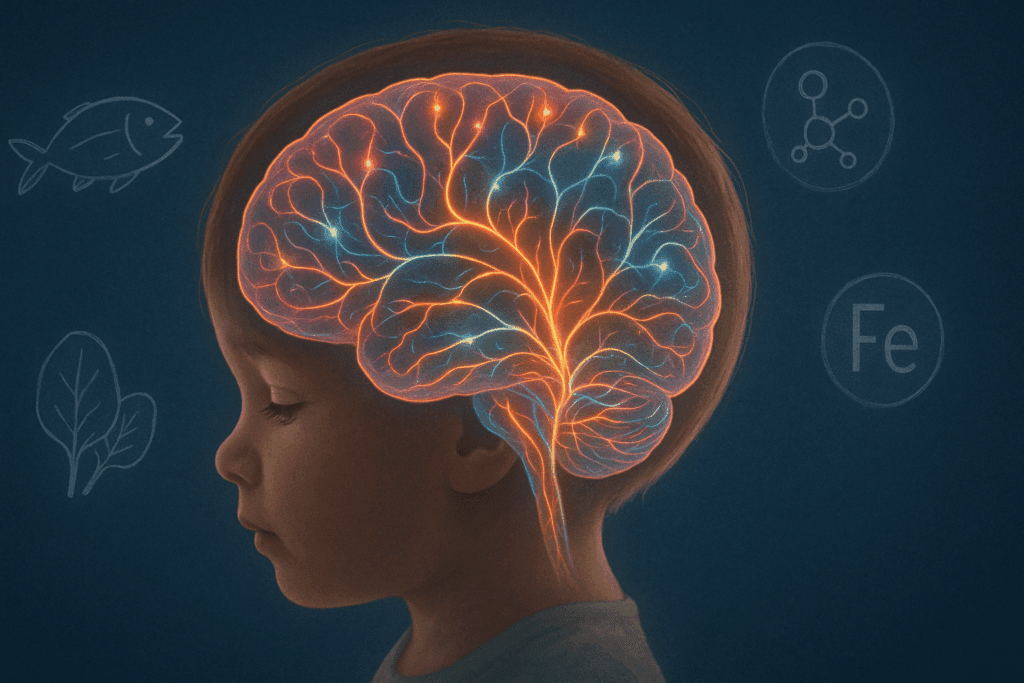
Why Brain Nutrition Matters in Childhood Cognitive Development
The brain experiences the most significant structural and functional changes during the first two decades of life. From early infancy through adolescence, synapses are formed, pruned, and remodeled in response to both internal and environmental stimuli. This neuroplasticity is highly dependent on nutritional availability. Vitamins and micronutrients act not only as cofactors in enzymatic reactions but also as structural building blocks for neurotransmitters, myelin sheaths, and cellular membranes.
Several longitudinal studies have shown that malnutrition—whether due to caloric deficiency or micronutrient imbalance—can lead to measurable impairments in IQ, executive function, and emotional self-regulation. Vitamin B-complex, choline, iron, zinc, and omega-3 fatty acids are especially vital during this time, with deficiencies in any one of these leading to disruptions in cognitive clarity and behavioral outcomes. In this context, the role of the best vitamins for child brain development becomes abundantly clear: they serve not only as protective agents against deficits but also as proactive tools to optimize mental performance.

Vitamins and Their Role in Enhancing Focus and Attention Span
Among the most common concerns voiced by parents and educators alike is the growing challenge of maintaining attention and mental stamina in young learners. While psychological and environmental factors certainly play a part, nutritional deficiencies are often overlooked contributors to inattention and poor focus. Several vitamins directly influence the brain’s ability to regulate attention through neurotransmitter modulation and metabolic support.
Vitamin B6, for instance, is essential in the synthesis of dopamine and serotonin—neurotransmitters associated with mood, impulse control, and concentration. A deficiency in B6 can manifest as irritability, hyperactivity, and reduced attention span. Similarly, B12 supports the formation of the myelin sheath that insulates neural pathways, ensuring efficient signal transmission. Without adequate B12, children may experience cognitive fog, sluggish processing, or even memory lapses.
Iron, though technically a mineral, deserves honorable mention here as well. It supports oxygen transport to brain tissue and is integral to dopamine metabolism. Children with iron deficiency are significantly more likely to be diagnosed with attention-deficit hyperactivity disorder (ADHD) or to display symptoms that mimic it. In such cases, thoughtfully selected brain supplements for kids that contain bioavailable forms of B vitamins and iron may help restore balance and support improved concentration.
The Connection Between Vitamin Intake and Learning Capacity
The process of learning involves far more than just absorbing information—it requires the encoding of new memories, the ability to retrieve stored knowledge, and the mental flexibility to apply that knowledge in new contexts. This sophisticated cognitive process demands optimal brain chemistry, which in turn relies on specific vitamins for peak efficiency.
Choline, often grouped with B-complex vitamins, is a crucial nutrient for the production of acetylcholine—a neurotransmitter that governs memory encoding and recall. Studies have shown that maternal choline intake during pregnancy correlates with improved memory scores in children several years later. Postnatally, choline continues to support hippocampal function, which is essential for consolidating both short- and long-term memories.
Folate (vitamin B9) also plays a central role in brain plasticity and learning. As a key contributor to DNA synthesis and repair, folate supports the cellular turnover needed for neurogenesis and synapse formation. Supplementation with folate during critical periods of growth has been associated with improved language acquisition and reasoning ability. These findings underscore why the best vitamins for child brain development often include a carefully balanced blend of B-complex nutrients, including choline and folate.
Omega-3 fatty acids, though technically not vitamins, amplify these effects by enhancing synaptic function and increasing membrane fluidity in brain cells. Together, these nutrients create a biochemical environment conducive to sustained learning and intellectual growth.
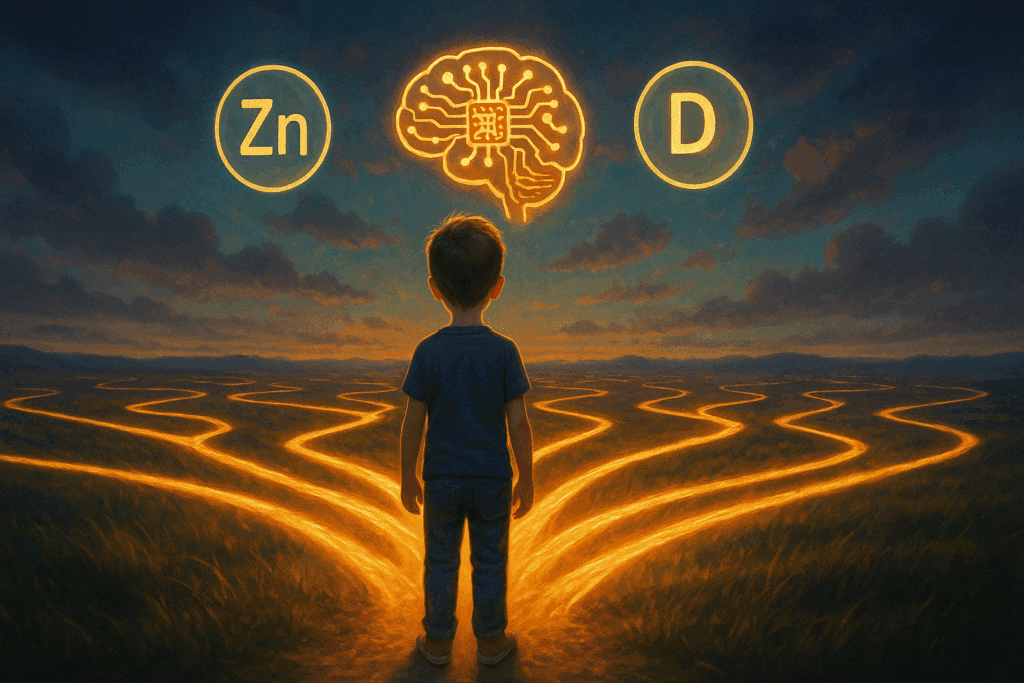
Decision-Making Skills and Executive Function: A Nutritional Perspective
Executive functions—including decision-making, planning, and impulse control—are governed primarily by the prefrontal cortex, a brain region that continues to mature well into a person’s twenties. During childhood, however, the groundwork for these abilities is already being laid. Nutrients that support neurogenesis, neurotransmitter balance, and cortical thickness are therefore integral to developing effective decision-making skills.
Vitamin D has emerged as a powerful modulator of neurodevelopment, particularly in its impact on serotonin production and inflammatory regulation. While most people associate vitamin D with bone health, its neurological role is increasingly recognized in psychiatric and cognitive research. Low vitamin D levels have been linked with diminished executive function and increased impulsivity, both of which hinder sound decision-making.
Zinc is another nutrient that merits attention. It influences synaptic signaling in the prefrontal cortex and hippocampus—regions involved in foresight, goal-setting, and evaluative reasoning. Inadequate zinc intake in children has been associated with cognitive inflexibility and behavioral disorders, particularly in settings where environmental enrichment is lacking.
By targeting these neurological underpinnings, brain supplements for kids that include zinc, vitamin D, and supporting cofactors may help enhance executive function in developing minds. Importantly, supplementation should always be considered as part of a comprehensive approach that includes physical activity, adequate sleep, and supportive caregiving.
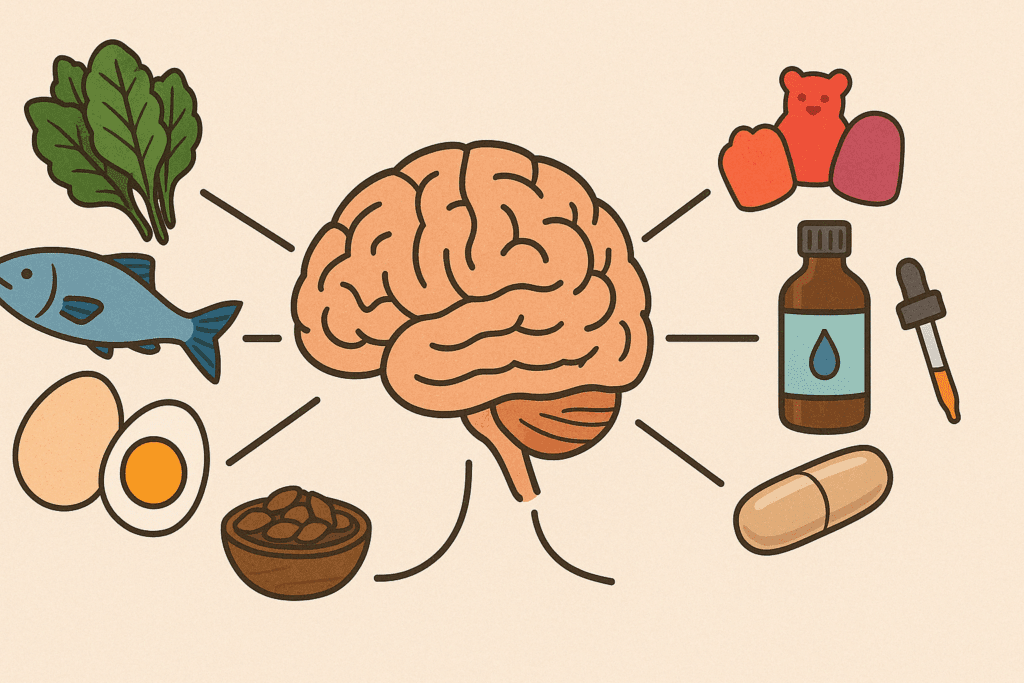
Understanding Supplementation vs. Whole-Food Sources
A common debate in pediatric nutrition centers around whether children should receive their nutrients from whole foods alone or whether supplementation is necessary. Ideally, children would obtain all essential vitamins and minerals through a varied, nutrient-rich diet. However, modern dietary patterns—characterized by processed foods, picky eating habits, and increasingly demanding schedules—can make this difficult.
While whole foods offer synergistic compounds like fiber and phytonutrients, supplements offer a way to bridge nutritional gaps without drastically altering family routines. The key is choosing high-quality formulations that are free from artificial colors, excessive sugar, and poorly absorbed forms of vitamins. The best vitamins for child brain development typically use bioavailable versions like methylated B12 and folate, chelated minerals, and emulsified D3 to ensure optimal absorption.
Parents should consult with pediatricians or registered dietitians before initiating any supplementation regimen, especially if their child has specific health concerns or is already on medication. When chosen wisely and used appropriately, brain supplements for kids can serve as a powerful complement to whole-food nutrition and lifestyle-based cognitive support.
What to Look for in Brain Supplements for Kids
The supplement industry is vast, and not all products are created equal. When selecting a supplement to support a child’s cognitive development, it’s important to assess both the ingredient profile and the formulation standards of the brand. First and foremost, the product should contain age-appropriate dosages backed by clinical research. Over-supplementation can pose risks, particularly with fat-soluble vitamins like A and D.
Parents should look for certifications such as NSF, GMP, or USP to ensure manufacturing quality and purity. Avoiding unnecessary additives like artificial sweeteners, preservatives, and synthetic dyes is especially important, given the developing nature of a child’s detoxification systems. Additionally, transparent labeling and third-party testing are markers of trustworthiness and align with the EEAT principle of authoritativeness in health content.
Some of the most effective brain supplements for kids feature comprehensive blends that include B-complex vitamins, omega-3s, choline, and antioxidants like vitamin E or C. These work synergistically to reduce oxidative stress, enhance neurotransmission, and protect developing neurons from environmental toxins.
Neurodevelopmental Conditions and the Role of Targeted Supplementation
Children diagnosed with neurodevelopmental conditions such as ADHD, learning disabilities, or autism spectrum disorders often have unique nutritional needs. Research has consistently shown that targeted supplementation can benefit certain subgroups of these populations, particularly when biochemical imbalances or absorption issues are present.
For example, omega-3 supplementation—especially high-DHA formulas—has been linked to improved reading ability, reduced hyperactivity, and enhanced emotional regulation in children with attention difficulties. Likewise, magnesium and zinc have shown potential in reducing irritability and improving sleep, both of which indirectly support better decision-making and learning.
It’s important to emphasize that while the best vitamins for child brain development can offer supportive benefits, they are not substitutes for professional evaluation or behavioral therapies. Rather, they should be viewed as adjunctive tools that can enhance therapeutic outcomes when used alongside individualized care plans. This integrated approach reflects a broader understanding of pediatric brain health as a multidimensional construct.
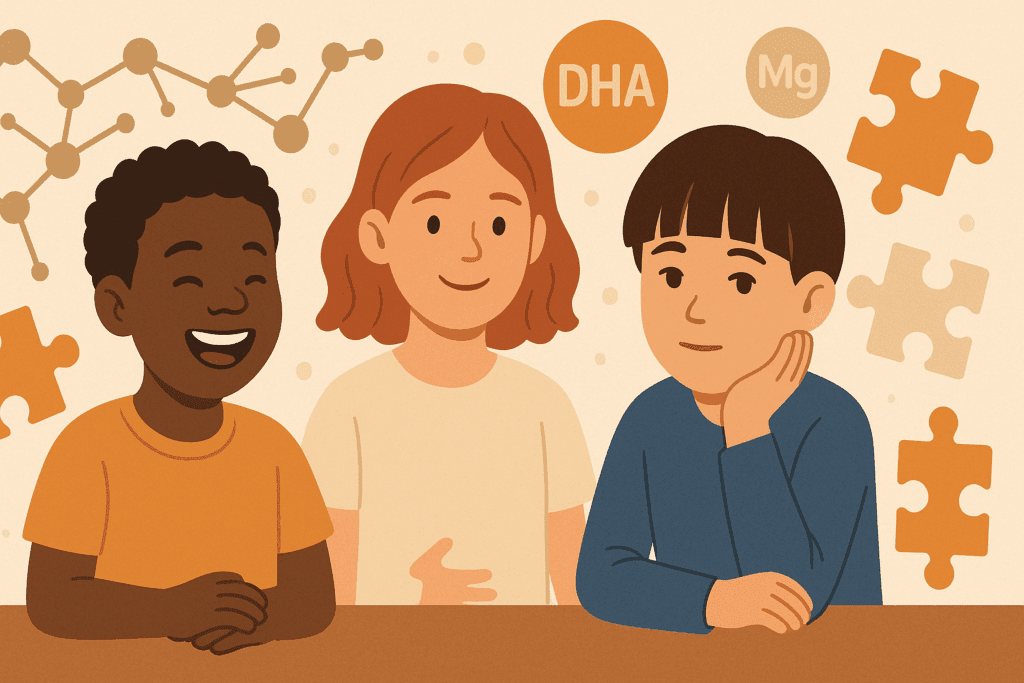
Supporting Cognitive Growth Beyond Supplementation
While this article centers on the impact of vitamins and supplements, it would be remiss not to mention the broader lifestyle and environmental factors that support optimal brain development. Nutritional support works best when paired with regular physical activity, creative play, limited screen time, and emotionally responsive caregiving. These experiences stimulate neural circuits, reinforce executive function, and provide the psychosocial scaffolding for lifelong learning.
Adequate sleep, for instance, consolidates memory and supports the detoxification of neurotoxins through the glymphatic system. Exposure to natural sunlight not only boosts vitamin D levels but also regulates circadian rhythms and mood. Encouraging outdoor play, mindfulness activities, and quality family interactions all play an instrumental role in shaping a child’s cognitive and emotional landscape.
The Future of Cognitive Health: Personalized Nutrition in Pediatric Care
As the fields of nutrigenomics and functional medicine continue to evolve, the future of cognitive health may lie in personalized nutritional interventions tailored to a child’s genetic and metabolic profile. This precision-based approach recognizes that nutrient needs are not uniform and that some children may require additional support in certain pathways—such as methylation, detoxification, or neurotransmitter synthesis.
Emerging research is exploring how variants in genes like MTHFR affect folate metabolism and how this may influence brain development and behavior. In such cases, standard folic acid may be less effective, necessitating the use of methylfolate in the best vitamins for child brain development. As testing becomes more accessible, parents and healthcare providers will be able to make more informed choices about supplementation, potentially improving outcomes in both typical and atypical developmental trajectories.
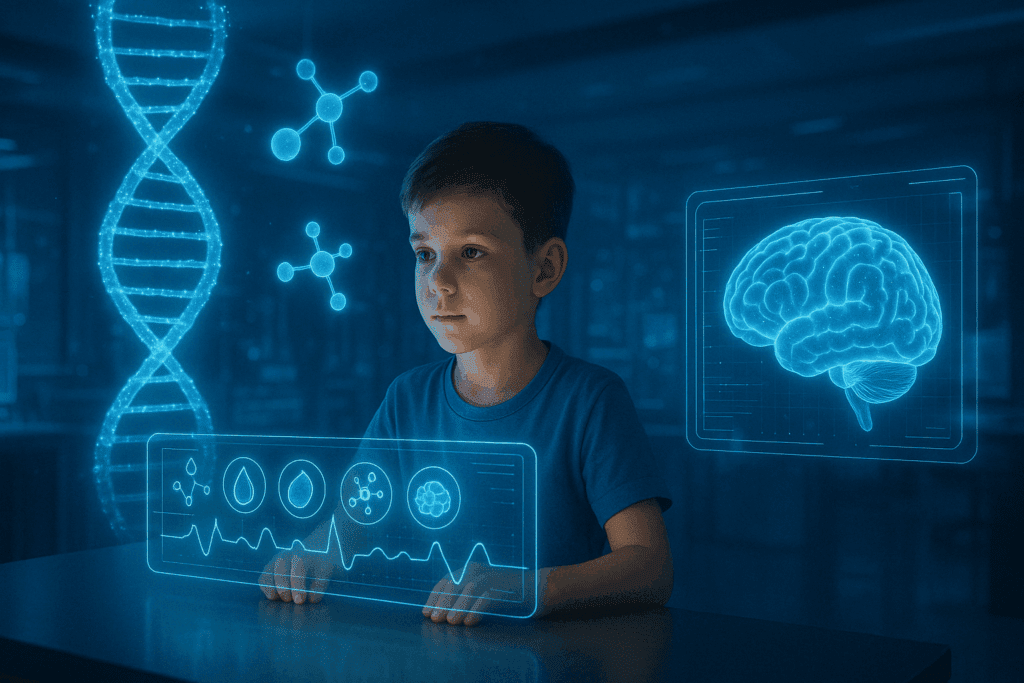
Frequently Asked Questions (FAQ): Brain Health Support for Children
1. Are there specific times during the day when brain supplements for kids are most effective?
Yes, timing can significantly influence how well brain supplements for kids work. Taking them in the morning with a balanced breakfast can enhance absorption and align with the body’s natural cortisol peak, supporting wakefulness and mental clarity during school hours. Some nutrients, like B vitamins and choline, support neurotransmitter production and are best used when cognitive demand is highest. Evening supplementation might be suitable for ingredients like magnesium or L-theanine, which support relaxation and sleep-related memory consolidation. Always consult a pediatrician to tailor timing based on the child’s age, sleep cycle, and dietary intake.
2. Can environmental factors affect how well the best vitamins for child brain development work?
Absolutely—environmental factors play a vital role in how nutrients are metabolized and utilized. A child exposed to chronic stress, excessive screen time, or poor air quality may experience increased oxidative stress, which can blunt the benefits of even the best vitamins for child brain development. Additionally, nutrient absorption can be impaired by highly processed diets or gastrointestinal inflammation, making a healthy lifestyle just as important as the supplements themselves. Sleep quality, physical activity, and even social interaction also influence how well the brain responds to nutritional support. In essence, a supplement is only as effective as the environment in which it’s taken.
3. How can parents tell if a brain supplement is actually making a difference in their child’s cognition?
While some effects may be subtle or gradual, attentive parents can look for specific signs of improvement. These might include better focus during homework, quicker verbal responses, improved memory retention, or a more consistent mood. However, it’s important to track changes over weeks, not days, and to avoid attributing all behavioral shifts solely to the supplement. Journaling observable patterns can help differentiate placebo effects from real improvements. In some cases, a pediatric neuropsychological evaluation before and after starting brain supplements for kids may offer objective insight into progress.
4. What are some emerging trends in brain supplements for kids that parents should watch for?
The next wave of innovation in brain supplements for kids includes formulations that combine nootropics with adaptogens, such as rhodiola or ashwagandha, which are thought to help modulate stress. Liposomal delivery systems—where nutrients are encased in fat-based carriers—are also gaining popularity for improving bioavailability, especially for fat-soluble vitamins crucial for neural development. Another trend is the inclusion of gut-brain axis support through prebiotics and probiotics, reflecting growing evidence that gut health strongly influences cognitive function. Future supplements may also personalize dosing based on genetic testing or microbiome profiles.
5. How do brain supplements interact with school-based learning interventions?
When used correctly, brain supplements can amplify the benefits of educational interventions by enhancing neuroplasticity—the brain’s ability to adapt and learn. For instance, omega-3 fatty acids may improve attention spans, allowing cognitive behavioral therapy (CBT) or literacy programs to be more impactful. Nutrients like zinc and iron can support faster neural transmission, which aids in processing new material. However, supplements are not a replacement for skilled teaching or supportive school environments. They should be seen as complementary tools in a holistic approach to education.
6. Are there any long-term cognitive advantages associated with early supplementation using the best vitamins for child brain development?
Emerging research suggests that early nutritional optimization can influence cognitive reserves, which may protect against future decline or mental health challenges. Vitamins like B12, folate, and DHA, when supplemented early in life, appear to support the formation of robust neural networks that persist into adolescence and even adulthood. However, the benefits are most pronounced when paired with intellectual stimulation, emotional nurturing, and a nutrient-rich diet. Longitudinal studies are still ongoing, but preliminary evidence supports the long-term brain benefits of early intervention with the best vitamins for child brain development.
7. How do parents choose between multivitamins and targeted brain supplements for kids?
The decision depends on whether the goal is general nutritional support or specific cognitive enhancement. A high-quality multivitamin ensures foundational nutrient coverage, which is critical if a child has a restricted or picky diet. On the other hand, targeted brain supplements for kids typically include specialized ingredients like phosphatidylserine, L-carnitine, or GPC choline, which support memory, focus, and executive function more directly. Parents might consider starting with a multivitamin and transitioning to targeted support based on observed needs, ideally under the guidance of a healthcare provider familiar with pediatric nutrition.
8. Are there any risks in using multiple brain supplements for kids at once?
Combining supplements without professional oversight can increase the risk of nutrient overload or negative interactions. For example, excessive iron can lead to gastrointestinal distress or interfere with zinc absorption, while too much vitamin A may be toxic over time. Additionally, stacking different nootropic compounds may overstimulate young brains, leading to anxiety or sleep disturbances. It’s critical to review labels carefully, avoid overlapping ingredients, and discuss any supplement regimen with a pediatrician to ensure safety and efficacy. Using the best vitamins for child brain development doesn’t mean using more—it means using the right ones in the correct doses.
9. What role do sleep and circadian rhythms play in supplement effectiveness for brain development?
Sleep is when much of the brain’s restoration and consolidation of learning takes place, so it’s a critical backdrop for any supplement to work effectively. Melatonin rhythms and deep sleep cycles influence how well the brain processes and stores information. Certain supplements, such as magnesium or glycine, may even enhance sleep quality, indirectly supporting brain development. Without adequate rest, even the best brain supplements for kids may fail to deliver noticeable results, as cognitive fatigue can override the biochemical benefits of nutrient intake. Synchronizing supplements with healthy sleep hygiene maximizes their potential.
10. Can dietary gaps in childhood be reversed later, or do early years create a permanent advantage?
While the brain maintains a degree of plasticity throughout life, the first few years are a critical period for establishing neural infrastructure. Missing key nutrients during this time—such as iron, iodine, or essential fatty acids—can lead to developmental delays that may not be fully reversible. That said, the brain is remarkably adaptive, and targeted interventions using brain supplements for kids, alongside cognitive training and proper diet, can produce significant catch-up improvements. Still, early and consistent access to the best vitamins for child brain development remains the most effective strategy for ensuring optimal outcomes.
Conclusion: Choosing the Right Brain Supplements for Kids to Support Lasting Focus, Learning, and Cognitive Confidence
The cognitive demands placed on today’s children are greater than ever. With academic expectations beginning earlier and screen-based distractions competing for attention, supporting the developing brain requires a thoughtful, evidence-based approach. Nutrition remains one of the most accessible and modifiable factors in cognitive development—and the best vitamins for child brain development can make a measurable difference in a child’s capacity to focus, learn, and make decisions with confidence.
Whether addressing subtle gaps in nutrition or responding to specific concerns like inattention or slow processing, brain supplements for kids—when chosen wisely—can serve as valuable allies in a broader strategy of neurodevelopmental support. But supplementation is not a magic bullet. It works best in harmony with holistic, nurturing environments that prioritize physical activity, emotional well-being, and consistent daily rhythms.
By understanding how each vitamin contributes to the architecture and function of the brain, caregivers can make informed decisions that honor both scientific rigor and the unique needs of their children. In doing so, they not only invest in their child’s immediate academic success but also in the lifelong skills of adaptability, focus, and sound decision-making that define cognitive resilience.
Was this article helpful? Don’t let it stop with you. Share it right now with someone who needs to see it—whether it’s a friend, a colleague, or your whole network. And if staying ahead on this topic matters to you, subscribe to this publication for the most up-to-date information. You’ll get the latest insights delivered straight to you—no searching, no missing out.


